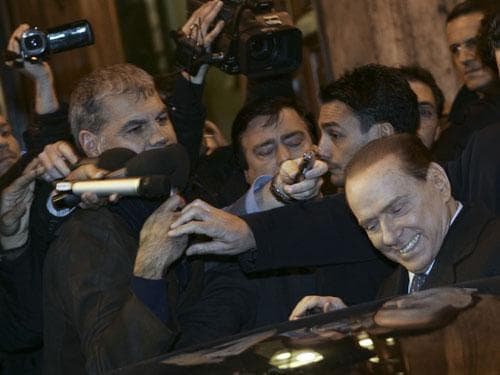Advertisement
Italy's Crisis And The Berlusconi Saga
ResumeWith Anthony Brooks in for Tom Ashbrook.

Silvio Berlusconi dominated Italian politics for a generation with a cult of personality that rivaled Mussolini’s. His TV stations, publishing houses and newspapers turned customers into political supporters and made government an extension of his business. He pledged to modernize Italy’s corrupt politics, but was ensnared in one corruption case after another.
There were also the showgirls, wild parties and charges of sex with prostitutes. But what finally brought him down wasn’t bunga bunga it was the bottom line of Euro-zone economics.
This Hour, On Point: arrivederci Berlusconi
-Anthony Brooks
Guests
Sylvia Poggioli, senior European correspondent for NPR’s foreign desk covering political, economic, and cultural news in Italy.
Beppe Severgnini, Italian journalist, author and columnist. He writes the daily “Italians” column for Italy’s Corriere della Sera newspaper. Author of: “Mamma mia! Berlusconi's Italy Explained for Posterity and Friends Abroad."
James Walston, Professor of International Relations at the American University of Rome, and an expert on Italian politics.
From The Reading List
The New Yorker In 2008, during his fourth campaign to become Prime Minister of Italy, Silvio Berlusconi released a video in which a beautiful blond woman, standing in a grocery store beside a pile of bananas, sings, “There’s a big dream that lives in all of us.” A throng of women belt out the chorus together under a cloudless sky: “Meno male che Silvio c’è”— “Thank God there’s Silvio.”
Slate How was it that Silvio Berlusconi—Mr. B. for short—was voted into power (1994), voted in again (2001), and voted back in (2008)? The hammerings he took in the administrative elections and referendum (2011) hint at change, but the question remains: Why does a majority of Italians support and/or put up with him?
The New York Times In the aftermath of a budget vote on Tuesday that made clear he no longer had a majority behind him, Mr. Berlusconi declared that he would resign as soon as Parliament passed a slate of economic reforms demanded by the European Union. That does not mean, however, that Mr. Berlusconi won’t retain a considerable part of his power and continue to affect Italian political life.
This program aired on November 14, 2011.